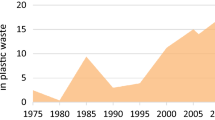Abstract
The management of household solid waste is a growing concern related to public health and environmental damage. The study examined socio-demographic factors, perceptions, and attitudes that influence household waste management practices in Chitungwiza, Zimbabwe. Stratified and random sampling techniques were used to select 314 participants for the study. Data obtained from the survey were analyzed using descriptive and square Chi-square tests of association. 55.7% of the 25–44 years of age group is responsible for managing waste at a household level. The results of a Chi-square test of independence suggested a strong significant association between gender, and willingness to pay for fortnight waste collection services (X2 (1) = 8.119 p < 0.017). 80.8% of respondents who are self-employed use buckets and plastic bags as waste receptacle facilities compared to 66% who are employed. Results of a fisher test indicate that there is an association between income, and waste receptacle used by participants (X2 (1) = 8.977, p < .03). However, gender, age, and level of education have no association with waste receptacle facilities used by individuals. Environmental planners need to consider socio-demographic status in formulating strategies to improve waste management practices in the developing countries context. The study recommends that local authorities need to promote active community involvement as a driver for behavior change towards sustainable solid waste disposal practices in urban areas.




Similar content being viewed by others
References
Gupta N, Yadav KK, Kumar V (2015) A review on current status of municipal solid waste management in India. J Environm Sci 37:206–217https://doi.org/10.1016/j.jes.2015.01.034
Kaza S, Yao L, Bhada-Tata P, Van Woerden F (2018) What a waste 2.0: A Global Snapshot of Solid Waste Management to 2050. (Urban Development, The World Bank, 2018)
Zurbrugg C (2002) Urban solid waste management in low-income countries of Asia how to cope with the garbage crisis. Presented for: Scientific Committee on Problems of the Environment (SCOPE) Urban Solid Waste Management Review Session, Durban, South Africa
Apinhapath C (2014) Community mapping and theory of planned behavior as. J Waste Manag 2014:1–8
Guerrero LA, Maas G, Hogland W (2013) Solid waste management challenges for cities in developing countries. Waste Manag 33(1):220–232
Jerie D, Tevera S (2014) Solid waste management practices in the informal sector of Gweru. J Waste Manag Zimbabwe. https://doi.org/10.1155/2014/148248
Manaf L, Samah M, Zukki M (2009) Municipal solid waste management in Malaysia: Practices and challenges. Waste Manag 29(11):2902–2906
Ferronato N, D’Avino C, Ragazzi M, Torretta V, De Feo G (2017) Social surveys about solid waste management within higher education institutes: A comparison. Sustain 9(3):1–17
Aderemi AO, Falade TC (2012) Environmental and health concerns associated with the open dumping of municipal solid waste: a Lagos, Nigeria experience. Am J Env Eng 2(6):160–165
Kumar S et al (2017) Challenges and opportunities associated with waste management in India. R Soc Open Sci 4(3):160764
Milea A (2009) Waste as a Social Dilemma: Issues of Social and Environmental Justice and the Role of Residents in Municipal Solid Waste Management, Delhi, India Master's thesis. Lund University, Lund, Sweden
Barr S (2007) Factors influencing environmental attitudes and behaviors: A UK case study of household waste management. Environ Behav 39(4):435–473
Babaei AA, Alavi N, Goudarzi G, Teymouri P, Ahmadi K, Rafiee M (2015) Household recycling knowledge, attitudes and practices towards solid waste management. Resour Conserv Recycl 102:94–100
Barr S, Gilg A, Ford N (2005) Defining the multi-dimensional aspects of household waste management: A study of reported behavior in Devon. Resour Conserv Recycl 45(2):172–192
Tadesse T, Ruijs A, Hagos F (2008) Household waste disposal in Mekelle city, Northern Ethiopia. Waste Manag 28(10):2003–2012
Huang L, Wu J, Yan L (2015) Defining and measuring urban sustainability: a review of indicators. Landsc Ecol 30(7):1175–1193
Barr S, Gilg A (2006) Sustainable lifestyles: Framing environmental action in and around the home. Geoforum 37(6):906–920
Mamady K (2016) Factors influencing attitude, safety behavior, and knowledge regarding household waste management in Guinea: A cross-sectional study. J Environ Public Health 2016:1–9
Purcell M, Magette WL (2010) Attitudes and behavior towards waste management in the Dublin, Ireland region. Waste Manag 30(10):1997–2006
Barr S (2007) Factors influencing environmental attitudes and behaviors: A UK case study of household waste management. Environm Behavior 39(4):435–473
Martin M, Williams I, Clark M (2006) Social, cultural, and structural influences on household waste recycling: a case study. Resour Conserv Recycl 48:357–395
Chanda R (1999) Correlates and dimensions of environmental quality concern among residents of an African subtropical city: Gaborone, Botswana. J Environ Educ 30(2):31–39
Rahji MAY, Oloruntoba EO (2009) Determinants of households willingness-to-pay for private solid waste management services in Ibadan, Nigeria. Waste Manag Res 27(10):961–965
Agwu M (2012) Issues and Challenges of Solid Waste Management Practices in Port-Harcourt City, Nigeria- a behavioural perspective. Am J Soc Manag Sci 3(2):83–92
Zimbabwe National Statistics Agency (ZIMSTAT) (2017) Inter-censal demographic survey, 2017. ZIMSTAT, Harare
Salkind NJ (ed) (2010) Encyclopedia of Research Design. SAGE Publications, Inc., Thousand Oaks, CA. https://doi.org/10.4135/9781412961288
Yousif DF, Scott S (2007) Governing solid waste management in Mazatenango, Guatemala: problems and prospects. Int Dev Plan Rev 29(4):433–450
Tevera DS (1991) Solid waste disposal in Harare and its effects on the environment, some preliminary observations. Zimbabwe Sci News 25(1–3):9–13
Environmental Management Act (EMA) (2007) Environmental Management (Hazardous Waste Management) Regulations 2007, Statutory Instrument 10:2007, Chapter 20:27. Government Printers, Harare, p 162
Funding
The authors disclosed receipt of the following financial support for the research of this article: This research received an Environmental Science Policy Program Summer Research Fellowship 2017 from Michigan State University.
Author information
Authors and Affiliations
Corresponding author
Ethics declarations
Conflict of interest
The authors declared no potential conflicts of interest concerning the research, authorship, and publication of this article.
Additional information
Publisher's Note
Springer Nature remains neutral with regard to jurisdictional claims in published maps and institutional affiliations.
Rights and permissions
About this article
Cite this article
Chikowore, N. Factors influencing household waste management practices in Zimbabwe. J Mater Cycles Waste Manag 23, 386–393 (2021). https://doi.org/10.1007/s10163-020-01129-9
Received:
Accepted:
Published:
Issue Date:
DOI: https://doi.org/10.1007/s10163-020-01129-9




